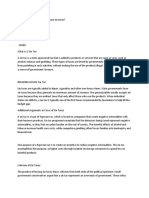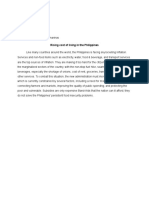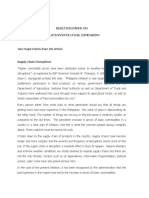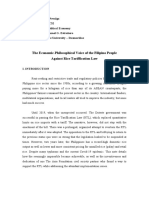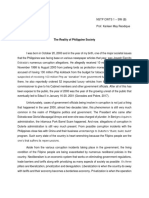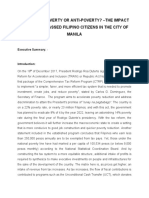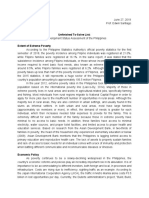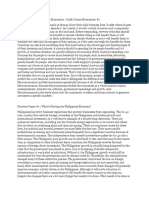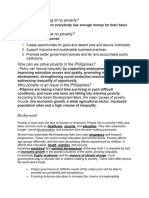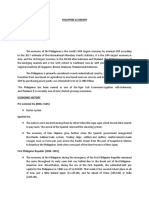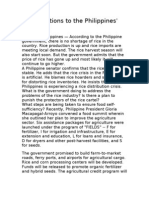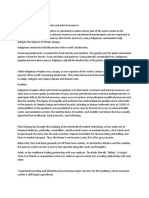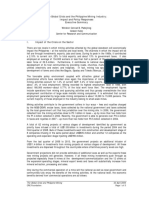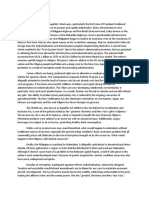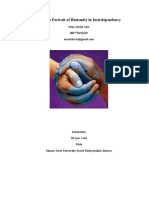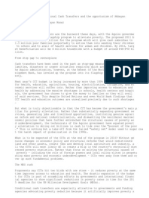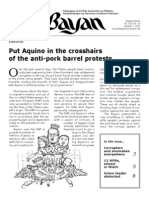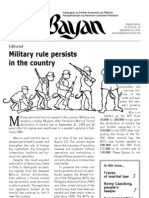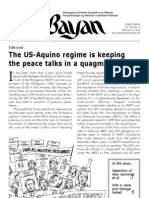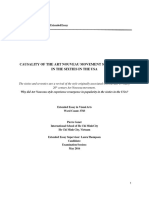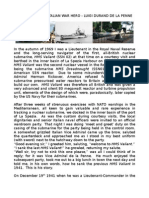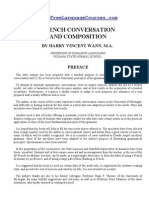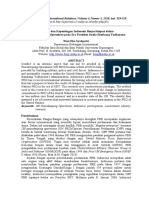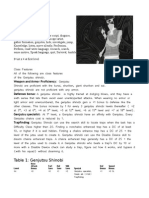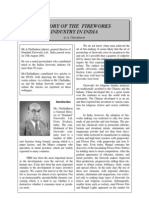End The Pro-Imperialist and Antipeople Economic System: Editorial
End The Pro-Imperialist and Antipeople Economic System: Editorial
Uploaded by
npmanuelCopyright:
Available Formats
End The Pro-Imperialist and Antipeople Economic System: Editorial
End The Pro-Imperialist and Antipeople Economic System: Editorial
Uploaded by
npmanuelOriginal Title
Copyright
Available Formats
Share this document
Did you find this document useful?
Is this content inappropriate?
Copyright:
Available Formats
End The Pro-Imperialist and Antipeople Economic System: Editorial
End The Pro-Imperialist and Antipeople Economic System: Editorial
Uploaded by
npmanuelCopyright:
Available Formats
ANG
Pahayagan ng Partido Komunista ng Pilipinas Pinapatnubayan ng Marxismo-Leninismo-Maoismo English Edition Vol. XLIII No. 2 January 21, 2012 www.philippinerevolution.net
Editorial
End the pro-imperialist and antipeople economic system
he Filipino people gravely abhor their continuously deteriorating economic conditions under the US-Aquino regime. After a year and a half in power, Benigno Aquino III has clearly demonstrated that his regime is no different from the Arroyo regime and all other past regimes in terms of economic policy and its inability to address the people's poverty and hunger. The problems of unemployment, low wages and rising costs of petroleum products, food and other basic commodities and services go on unabated. Landlessness, lack of housing for the urban poor and epidemics run rampant even as education and health services continue to deteriorate. Massive environmental destruction has moreover aggravated the people's economic hardship. Social inequality has become increasingly stark, with the masses of workers, peasants, farm workers, minority peoples, ordinary employees, small professionals, students and other sectors living lives of growing wretchedness and big foreign capitalists and their big comprador capitalist, landlord and bureaucrat capitalist cohorts living ever more profligately by intensifying their exploitation and oppression of the toiling masses, plundering the nation's natural resources and wielding reactionary state power to favor and protect their businesses and properties. The Aquino regime would have the people believe that it is taking the righteous road in contrast to the rampant corruption of the previous regime. In fact, not only are bureaucrat capitalism and corruption widespread under the Aquino regime. It has also perpetrated the trade and investment liberalization policies as well as deregulation,
privatization and denationalizationthe very same ones enforced by Arroyo during her time. Laws on deregulation remain in effect and continue to be used by big foreign capitalists and their cohorts to raise the prices of oil, water, power, train fares, toll fees and medical and educational services with impunity. Deregulation also continues to serve as the framework for justifying state budgetary reductions in social services and giving free rein to the private sector of big capitalists and compradors to commercialize schools, hospitals and roads, among others. Trade and investment liberalization policies that have provided the context for laws such as the Mining Act of 1995, the Foreign Investments Incentives Act, the Omnibus Investments Code and provisions of the General Agreement on Tariffs and Trade (GATT) continue to cause great destruction to the local forces of productiom, especially the masses of Filipino workers. To attract foreign investments, wages have been frozen to provide cheap labor. Casualization, contractualization and other flexible labor systems continue without letup. The Aquino regime
In this issue... SC: Court of ruling classes
3 5
Persecution of Alan Jazmines 22 AFP casualties in Bukidnon
continues to favor foreign big capitalists by granting them tax holidays and easing restrictions on profit and capital remittances and repatriation. It protects the operations of foreign big mining companies and allows the latter to plunder the country's mineral wealth, ostensibly to generate employment. The mining companies' less than 1% contribution to employment generation comes at the cost of depleted natural resources and irreversible environmental damage. The liberalization of the agricultural sector has for decades been invoked by big capitalist countries to dump their agricultural products in the Philippines to the detriment of local agricultural production. The liberalization of this sector has allowed the entry of foreign big agro-corporations that have been propagating seeds, pesticides and other products that have eroded self-reliant production and tied local production to expensive foreign capital goods. Foreign big multinational corporations continue to seize vast tracts of land.
Big landlords, merchants and foreign big capitalists have intensified their exploitation and oppression of peasants and farm workers. Aquino has allocated a huge portion of the government budget to serve the interests of foreign big capitalists through the Public-Private Partnership Program (PPP). Through the PPP, major infrastructure projects are ceded to foreign big capitalists and their local business partners. The projects are funded by government money and state-guaranteed loans contracted from foreign banks. As in the case of the Light Rail Transit, the South Luzon Expressway and similar projects, the private sector of big capitalists is eventually given full control to amass profits. The Aquino regime's economic policies are all geared towards the perpetuation of the current semicolonial and semifeudal system. These policies intensify the exploitation and oppression of the toiling masses and the Filipino people. They condemn the entire country to crisis. They
ANG
Contents
Editorial: End the pro-imperialist and antipeople economic system Oil price hike SC: Tribunal of the ruling classes Coronas impeachment Persecution of Alan Jazmines Ka Bart still in jail GenSan media man killed Farmers arrested in Pangasinan Violent demolition in San Juan Mining in Pantukan 22 AFP casualties in Bukidnon 8th IDs Gen. Mario Chan: Liar Strike in Nigeria 1 3 3 5 5 6 7 7 7 8 9 10 10
Vol. XLIII No. 2 January 21, 2012 Ang Bayan is published in Pilipino, Bisaya, Iloko, Hiligaynon, Waray and English editions. It is available for downloading at the Philippine Revolution Web Central located at: www.philippinerevolution.net Ang Bayan welcomes contributions in the form of articles and news. Readers are likewise enjoined to send in their comments and suggestions for the betterment of our publication. You can reach us by email at: angbayan@yahoo.com
Ang Bayan is published fortnightly by the Central Committee of the Communist Party of the Philippines
stunt local industries and prevent the emergence of an independent and self-reliant economy. They perpetuate monopoly control over land. They destroy local production and generate problems of mass unemployment. Instead, the regime contents itself with exporting labor to other countries and concocting shortterm showcase programs that generate temporary employment. The poverty and oppression of the Filipino people are bound to worsen in the face of plans by the Aquino regime to further open the Philippine economy to comply with US imperialist dictates. The crisis is pushing the Filipino people towards the path of mass struggle to fight for their democratic interests. The worsening crisis that has been bludgeoning the Filipino people is creating conditions that rouse them to awareness of the basic problems that lie at the roots of their poverty and suffering. It is the duty of the revolutionary forces to reach out to the people in their millions and rouse them to the need for national and democratic change. The revolutionary and progressive forces must thoroughly expose the roots of crisis and dispel counterrevolutionary and reformist ideas being propagated by the imperialists through schools, the mass media, the internet and other information channels. The revolutionary forces must persevere in mobilizing millions upon millions of people to tread the path of people's war and advance it to the next higher stage. Growing numbers are becoming conscious of the fact that the Filipino people's welfare can best be ensured only under a government that truly serves ~ their interests.
ANG BAYAN January 21, 2012
Confront onerous policies with massive protests
he Communist Party of the Philippines stands in solidarity with the Filipino people in condemning foreign oil companies for raising the prices of petroleum products four times in merely 20 days. These oil price increases come on top of a hike in water rates of P2.335 per cubic meter starting January 1 and higher power rates imposed by companies owned big bourgeois compradors like the Lopez and Aboitiz families. The CPP also condemns the US-Aquino regime for turning a deaf ear to the people's sufferings, its intransigence in imposing the 12% Value-Added Tax on petroleum products and its continuing implementation of privatization and deregulation which adds to the Filipino people's burdens. Particularly onerous to the people are the oil deregulation law, the Electric Power Industry Reform Act of 2001 (R.A. 9136) or EPIRA which has spurred hikes in power rates, and the law that privatizes water services. In the face of these unceasing hardships imposed on the people, the CPP called on workers' unions and people's organizations to resist hikes in oil, water and power rates by launching huge protest actions. The CPP cited the mass actions launched by the Nigerian people who have recent-
ly been victimized by an oil price hike of close to 130% after the withdrawal of government oil subsidies. Nigerians in their numbers collectively waged strikes, work stoppages and demonstrations. After a week of protest actions, the Nigerian government effected a 35% reduction in fuel prices. In the Philippines, the Pagkakaisa ng Samahan ng mga Tsuper at Operators Nationwide (PISTON) trooped to the Pilipinas Shell office in Makati City on January 11 to condemn the latest round of oil price hikes. Diesel prices rose by up to P1.50 per liter while gasoline prices were marked up by P1.75 per liter. Oil prices were earlier raised on January 3, with diesel prices hiked by 30 centavos per liter and gasoline, by 70 centavos per liter. PISTON chair George San Mateo blasted the foreign oil cartel for exploiting conflicts in the Middle East to raise the prices of petroleum products artificially despite the absence of an actual war or a shortage in oil supplies. The regime has likewise been cashing in on the oil price hikes by collecting more ~ taxes. by saying that it had no power to prevent the president and the cabinet from entering into contracts with foreign companies. Also in 2004, the Supreme Court declared constitutional Arroyo's order expanding the scope of
Supreme Court: Tribunal of the ruling classes
he Supreme Court has been placed at the center of factional struggles among the ruling classes with the ruling Aquino clique's attempts to oust Chief Justice Renato Corona. Nonetheless, like other branches of the reactionary government, the Supreme Court has historically served as an instrument to preserve the puppet, rotten and repressive reactionary system and the collective interest of the ruiling classes. cause of its provisions that allow foreign mining. But after a pro-mining campaign by Arroyo, the Supreme Court reversed its own decision in December of that year, justifying it
Under the past regime, the Supreme Court issued a series of decisions favoring Gloria Arroyo's pro-imperialist and antipeople policies, among them the Mining Act of 1995, the Expanded Value-Added Tax and the oil deregulation law. The Supreme Court declared the Mining Act of 1995 unconstitutional in January 2004 be-
ANG BAYAN January 21, 2012
the Value-Added Tax. (The Expanded VAT, a law that did not pass through Congress was strongly opposed by the people). The Supreme Court had also previously reversed its ruling on the oil deregulation law despite the continued existence of a monopoly in the oil industry. It had earlier struck down the law because of the prevailing oil cartel in the country. Even in individual cases, the majority of Supreme Court decisions were on the side of foreign capitalists, big bourgeoisie and landlords favored by the president in power. One example involves the Supreme Court decision on September 7, 2011 declaring the termination by Philippine Airlines (PAL) of 1,400 stewards and stewardesses illegal. A month after, it reversed its decision on a mere technicality. Corona and Arroyo's relationship. In the majority of cases, a Supreme Court justice's votes or decisions are in accordance with the interests of the appointing president and his or her patrons. This is apparent in the record of the current chief justice Renato Corona who has been impeached by the Lower House and is now facing trial at the Senate. Arroyo appointed
him associate justice in 2002. Before his appointment to the Supreme Court, Corona served as Arroyo's spokesperson when she was still vice president. When Arroyo became president, Corona served as her chief of staff, spokesperson and executive secretary. The Supreme Court decision overturning a November 2011 order of the Department of Justice banning the Arroyo couple from traveling abroad is but one of the many pro-Arroyo rulings issued by the high tribunal under Corona. The Supreme Court had earlier overruled Congress' impeachment of Merceditas Gutierrez, another Arroyo lackey. In Corona's nine-year stint at the Supreme Court, up to 78% of his decisions on political cases favored the Arroyo camp. He upheld Presidential Proclamation 1017 issued in 2006 which imposed a martial law-like state of emergency nationwide. The majority of the Supreme Court declared PP 1017 unconstitutional but Corona issued a dissenting opinion. Corona also took Arroyo's side on Executive Order 464 which barred department heads and agency chiefs from attending and testifying in the series of Congressional and Senate investigations then being held on corruption in the Arroyo regime. He also upheld National Economic Development Authority director Romulo Neri's decision not to testify on the anomalous arrangements entered into by the Arroyo couple with the Chinese-owned ZTE company. Corona had likewise defend-
ed the Arroyo camp when it launched the People's Initiative to introduce amendments to the 1987 Constitution that would have extended the terms of incumbent officials. The control wielded by the ruling clique on the chief justice or the majority of Supreme Court justices is crucial. Arroyo had appointed up to 21 justices during her term. Even if the Supreme Court had gone maverick under Chief Justice Reynato Puno (2006-2010), it was never a threat to her rule. Thus, before Arroyo stepped down as president, she lost no time in putting Corona at the court's helm. Aquino is himself aware of the Supreme Court's importance in his family and clique's rule. The Supreme Court decision ordering the distribution of Hacienda Luisita's lands to its farmers and farm workers was a big blow to him and his family. Earlier, the Supreme Court had also struck down the Truth Commission that Aquino had ostensibly formed to prosecute Arroyo. Aquino, has, from the very beginning, refused to recognize Corona as a legitimate chief justice. The essentially reactionary and filthy character of the rival Aquino and Arroyo-Corona camps is increasingly being brought to the fore as the conflicts between the two cliques intensify. Just a few days into the Corona trial, Hacienda Luisita Inc. (HLI) filed a motion of reconsideration and clarification before the Supreme Court on its decision to distribute the hacienda lands and abolish the SDO scheme. HLI also plans to file a motion to ban Corona from joining any of the court's deliberations on the hacienda. ~
ANG BAYAN January 21, 2012
Chief Justice Corona on trial
hief Justice Renato Corona's trial at the Senate began on January 16. powerful post in place of Corona. Long before the trial began, the two camps had already been at each other's throats. Corona has openly said that the real reason behind his impeachment is Aquino's hurry to have him replaced as chief justice. On the other hand, the Aquino regime's allies in the Lower House have been unstoppable in exposing Corona and his family's corruption and the other skeletons in their closets. Aside from extensive real estate properties, Corona is said to have large amounts deposited in several bank accounts. Malacaang has also been quick to exploit a World Bank report complaining about how the Supreme Court has used a loan it extended in 2003 for purposes other than judicial reforms. As far as the democratic organizations and the Filipino people are concerned, a major strumbling block to having Arroyo and her lackeys tried for their crimes will be removed should Corona be found guilty. ~
The Filipino people have been focused on this trial because they consider it a part of the overall effort to hold Gloria Arroyo accountable for her crimes against the people. Arroyo raced to have Corona appointed as chief justice of the Supreme Court to ensure that things will go favorably for her in her time of need. The congressman-prosecutors have begun to look into allegations on Corona's ill-gotten wealth. They said Corona has 45 pieces of property worth more than P200 million held in his wife and close relatives' names, and which he failed to declare in his Statement of Assets, Liabilities and Net Worth (SALN). As the trial runs, the prosecutors are also expected to demonstrate how Corona's decisions favored Arroyo. The internal bickerings and range of political interests within the Supreme Court are becoming more and more public as the trial progresses. The justices and their patrons have been scrambling to have themselves appointed to the
Progressives condemn Alan Jazmines persecution
Jazmines first caught the ire of prison authorities when he began exposing the latter's violations of the detainees' human rights and the unjust restrictions and inhuman conditions of the prisoners. He led the detainees' struggles against repressive policies and inhuman conditions inside the detention center. Jazmines was again threatened with transfer when he lodged a complaint after prison authorities banned the entry of postcards saying Free All Polit-
ver since NDFP Consultant Alan Jazmines' illegal detention, officials of the PNP Custodial Center in Camp Crame have threatened several times to transfer him to another prison. ical Prisoners. He also slammed the police for opening his personal correspondence, including confidential documents and communication on the peace talks. Of late, Jazmines was threatened anew when he complained against maneuvers of the custodial center to prevent the visit of more than 30 supporters of three detained NDFP consultants (himself, Eduardo Sarmiento and Eduardo Serrano).
The police claimed that the camp was on heightened alert. Also barred were legitimate reading materials that were in the public domain and brought in by the visitors such as a document of the National Council of Churches in the Philippines entitled Churches' Response as Human Rights Defenders, a KARAPATAN primer on
ANG BAYAN January 21, 2012
Oplan Bayanihan and issues of Pinoy Weekly. Jazmines belied claims by the PNP Custodial Center that he was being transferred because of his bad behavior inside the prison. He is being targeted for transfer to Bicutan, where conditions are more stringent and more repressive. Free all political detainees. Meanwhile, 38 congressmen filed House Resolution 1956, which calls for the granting of general and unconditional amnesty to all political detainees who are victims of political persecution and charged with, or convicted of, political and/or common crimes done in pursuit of their political beliefs. House Resolution 1956 states that the first priority for release are ten political detainees who should have been freed as early as 2001 and 2004, in accordance with agreements arrived at in the peace
talks before the latter was sabotaged by the Arroyo government. They are Matricio Manuelito, Joshue Ungsod, Juanito Itaas, Rogelio Natividad and Darwin Rojas (2001); Ricardo Solangon, Galo Omar, Palili Jammang, Moner Taufic and Abibakar Bimbas (2004). In the second priority are elderly political detainees, in particular Rolando Paniamigan, the Alegria family, Sandino Esguerra and Moahamadiya Hamja. In the third priority are the remaining NDFP consultants who are protected by the Joint Agreement on Safety and Immunity Guarantees (JASIG) and whose release is also in accordance with a promise by the GPH Negotiating Panel in February 2011 to free most, if not all, of the political detainees. These are Alan Jazmines, Tirso Ka Bart Alcantara, Randy Malayao, Edgardo Friginal, Eduardo Sarmiento,
Leopoldo Caloza, Eduardo Serrano, Emeterio Antalan, Ramon Patriarca, Danilo Badayos, Alfredo Mapano, Pedro Codaste and Edwin Brigano. In the fourth priority is hors de combat Vanessa de los Reyes, an NPA fighter paralyzed from the waist down after sustaining a gunshot wound to her spine. In the fifth priority are 35 women political detainees who remain vulnerable to sexual abuse while imprisoned, aside from the other hardships they have to bear while in detention. Ericson Acosta and Maricon Montajes, two cultural workers from the University of the Philippines-Diliman who were investigating the conditions of farmers and exposed their poverty through creative art should also be released. They were slapped with trumped-up charges of illegal possession of ~ explosives and firearms.
Ka Bart still languishing in jail
irso Ka Bart Alcantara has been detained for more than a year now despite promises made by the US-Aquino regime to release the consultants of the National Democratic Front of the Philippines (NDFP). Ka Bart was arrested on January 3, 2011 in violation of the Joint Agreement on Safety and Immunity Guarantees (JASIG). In the course of negotiations, the GPH made this promise three times, twice in signed agreements in January and February 2011, and once in a consultation in September 2011 with the Norwegian governmen which serves as the third party facilitator in the peace talks. The GPH should first release Ka Bart and all NDFP consultants in order for the peace talks to advance. The US-Aquino regime's failure to make good on its promise to release Ka Bart and other NDFP consultants proves that the regime is not interested in pursuing the peace negotiations. It is only interested in using the peace talks as an instrument to effect the surrender and pacification of the revolutionary forces within the framework of the Oplan Bayanihan war of suppression. ~
ANG BAYAN January 21, 2012
PNP arrests 7 peasants in Pangasinan
even peasants were arrested in Pangasinan on January 12 after they prevented police from fencing off their farm lands in Bayambang, Pangasinan. The farmers were identified as Rodolfo Natividad, Emeterio Paningbatan, Felipe Caro, Bernardito Dizon, Rudy Peralta, Rodrigo Asuncion and Ludivico Mejiaall members of Ulopan Na Umbaley Ed Camp Gregg Military Reservation. According to the Alyansa ng mga Magbubukid sa Gitnang Luzon (AMGL), the seven peasants were arrestd after they stopped authorities from fencing off close to 300 hectares of farm lands that they had long been tilling in Barangay Bical Sur in Bayambang. Pangasinan Gov. Amado Espino ordered the farm lands fenced off to give way to the construction of a private resort in the area. The AMGL added that since the Department of Environment and Natural Resources had declared this part of the Camp Gregg Military Reservation public land, no one had the right to claim it. The Cojuangco-Aquino family has reportedly shown interest in the land. Four of the farmers were released the same day but the remaining three were held at the police station and charged with attempted murder. Meanwhile, the Rizal Commercial Banking Corporation has demanded the arrest of 22 peasant leaders and farm workers of Hacienda Luisita for allegedly occupying illegally a lot owned by RCBC. The Alyansa ng mga Manggagawang Bukid sa Hacienda Luisita (AMBALA) said that the occupation was legitimate since the more than 500-hectare lot owned by RCBC had been idle for a long time. AMBALA added that it had also filed a petition with the Department of Agrarian Reform to revoke the land-use conversion and distribute the land instead to AMBALA members. ~
Media man killed in GenSan
hristopher Guarin, 41, editor and publisher of Tatak News, a newspaper based in General Santos City, was shot dead by two gunmen on January 6 while he was on his way home in Barangay Lagao of the same city. The wounded Guarin managed to get out of his car in a bid to spare his wife and child. He sustained five gunshot wound to the body and one in the head. His wife was also wounded in the attack. Guarin is the first media personality killed in 2012 and the tenth since Benigno Aquino III came to power. One-hundred and fifty (150) Filipino media practitioners have been killed since 1986 and have not been given justice. The victim was a former radio commentator and reporter of Bombo Radyo. He also served as station manger of DXBB Super Radyo GenSan. He had been receiving many death threats before he was killed. ~
Violent demolition in San Juan
he homes of several families living in an urban poor community in Corazon de Jesus (CDJ) in San Juan City were violently demolished on January 12. Up to 20 residents were illegally arrested and 31 wounded (two seriously) after a composite group of more than 600 elements of the Philippine National Police (PNP) and members of a demolition team forced their way into Narciso Street where the urban poor had put up a barricade. Members of progressive youth organizations were placed under surveillance. Community leaders were slapped with trumped-up charges and arbitrarily arrested. Up to 400 families had already been evicted in 2010 and more than a hundred other fam-
The residents were unarmed and used whatever items were available in their communities to actively defend their homes. Even before the demolition, state forces had long been assaulting and intimidating the residents. Military forces were deployed within the community.
ANG BAYAN January 21, 2012
ilies are now affected. The attackers used water cannons and tear gas against the barricaders to forcibly evict them. Through sheer police brutality, the demolition team was able to force its way into the community and tear down the houses. Most of the residents are now temporarily housed in makeshift shelters within Corazon de Jesus through the help of church workers. They have remained in the area and are ready to fight the local government's next move. In the face of intensified oppression, they are asserting their dignity through allout and militant resistance. The residents had twice been awarded the land under the past
7
regime. When the local government of San Juan refused to acknowledge this, the residents asked not to be brought to farflung relocation sites and be transferred within the city and their living conditions improved. But the San Juan government led by Mayor Guia Gomez and the Estrada clan likewise refused this compromise. The Estradas plan to put up a posh City Hall on the more than one-hectare lot that once hosted the demolished houses. Other construction projects include a condominium, commercial shopping areas and a parking lot. The Estradas have partnered with a big bureaucrat involved in the mall construction business. The entire plan falls under the Aquino regime's Public-Private Partnership Program. Like others of its kind in Metro Manila, this project also serves as payment for Aquino's debt of gratitude to big bureaucrat capitalists and political allies who put him in power. The same story is behind other pending demolitions in communities in North Triangle, Pangarap Village, Welfareville and Freedom Island, to name a few.
In just over a year, the Aquino regime has become notorious for its violent and inhumane demolitions that have caused suffering to the urban poor. They are no different from the Aquino family's brutal treatment of peasants struggling for genuine agrarian reform in the countryside. Progressive organizations, patriotic sectors and the church have assailed the violent demolition and have asked Congress to investigate.The Kabataang Makabayan and the National Democratic Front in the National Capital Region hailed the residents, especially the youth who stood up and defended their homes and their rights in Corazon de Jesus. The Communist Party of the Philippines praised the CDJ residents' resistance and their courage and determination in collectively confronting the Aquino regime's schemes to drive them away from their homes. Said the CPP, there will be many other attacks by the regime on the urban poor because of continuing projects under the PPP. Nonetheless, the people will not relent in organizing and mobilizing to resist the regime. ~ small miners out of the area. Russell Mining and Minerals Inc. (RMMI) posted an armed security force to ensure its control. The Armed Forces of the Philippines (AFP) also deployed the 71st IB in Barangay Tibagon, Pantukan. These armed forces sow terror in the mining communities and have committed many human rights violations. On April 12, 2011, elements of the 71st IB killed Santos Ricky Manrique, 49, president of the Federation of Miners' Associations in Pantukan (FEDMAP). Manrique, who was killed in his house in Napnapan, Pantukan was active in the struggle against the entry of foreign big mining companies in the area. The entire area is now under Oplan Bayanihan. Kingking Gold-Copper ProC ject. The small miners, their families, church people and antimining activists are mainly opposed to the Kingking Gold-Copper Project (KG-CP) which aims to extract gold and copper from the villages of Kingking and NapnaANG BAYAN January 21, 2012
US-Aquino regime favors big mining companies
he Communist Party of the Philippines strongly condemned the US-Aquino regime for exploiting the January 5 tragedy in Pantukan, Compostela Valley to forcibly evict poor and small miners and mining workers from their community. The regime is blaming small miners for the series of landslides in the area. In fact, the landslides are due to exploration activities by big mining companies and past logging operations. Mining Act of 1995. In 1995-97 came Kingking Mines Inc., a partner of EchoBay Mines Inc. and Toronto Ventures Inc., both Canadian-owned companies. The widespread denudation of the forests and excavations by foreign companies in the area have resulted in many tragedies, the most striking of which was the landslide that occurred at the Apex Mining Corporation mining site in Barangay Masara, Maco town in 2008 that killed 27 residents. Even before the January 5 tragedy, the US-Aquino regime and the mining companies had already wanted the workers and
Since the 1950s, big logging and mining companies have been feasting on the bounties of Compostela Valley's mountains. Maintaining one of the biggest operations is Aguinaldo Development Corporation (ADECOR) which exports logs and plywood to Japan. Since 1969, mining exploration has been conducted in Pantukan municipality by the Nationwide Development Corp. (NADECOR) and the Mitsubishi Metals Mining Corporation of Japan. In the 1990s, Benguet Corporation and its American partner entered the picture. More foreign mining companies poured in with the passage of the
8
pan in Pantukan. The KG-CP is likewise linked to the biggest gold and copper deposits in Mt. Diwalwal which is in Monkayo town, Compostela Valley. The mountains of Pantukan are rich in gold and copper deposits. Based on the latest studies, it is estimated that 13 out of the town's 15 barangays possess such mineral deposits. But the most concentrated deposits are in the mountainous areas of Kingking and Napnapan that cover 1,650 hectares. The KG-CP will be able to extract an esimated 791.5 million tons of gold and copper worth $70 billion or more than P3 trillion. Its target area is therefore known to have one of the biggest untapped gold and copper reserves worldwide. It will
reportedly take 23 years before these deposits are depleted. This explains why several big foreign mining companies have been coveting the area's mineral wealth so much. With its potential revenues, the KG-CP has been cited as one of the lead projects of the USAquino regime and forms part of the Mindanao 2020 Program. Thirteen companies applied with and vied for a place under the KG-CP in 2009, but RMMI, an American company in joint venture with NADECOR was favored above the rest and granted a 1,650-hectare concession. It began operations in 2011. RMMI simultaneously expanded its concession to 4,000 hectares. In June 2010, the Aquino
regime also granted Napnapan Mineral Resources Inc. (NMRI) a 4,500-hectare concession through a Mineral Production Sharing Agreement (MPSA). The KG-CP utilizes open-pit mining, thus making the destruction of the environment and the people's livelihoods a foregone conclusion. More than 8,000 families or 40,000 residents are set to be evicted from their farms once the RMMI begins its operations. Among the areas to be covered by the foreign-owned companies' operations are the Mansaka tribe's more than 8,000-hectare ancestral lands. In 2011, the residents of Pantukan began their struggle against the giant foreign mining companies. ~
6 soldiers killed, 16 wounded in Bukidnon
ix soldiers of the Armed Forces of the Philippines (AFP) were killed and 16 were wounded in two separate ambushes launched by Red fighters of the New People's Army (NPA) on January 18 in Barangays Sinuda and Palakapan in Kitaotao, Bukidnon. In a statement, Ka Rigoberto Sanchez, spokesperson of the Merardo Arce Command (NPASouthern Mindanao) said the inter-front operation was aimed at raising the fighting spirit of the peasantry against the brutality of the 23rd IB. It was 6 a.m. when a platoon of Red fighters from Front Guerrilla Units 55 and 56 ambushed 23rd IB troops aboard a private vehicle, killing two soldiers and wounding four others. After three hours, a commando unit from Front 53 ambushed a convoy composed of a six-by-six truck and an amphibian vehicle bearing 10th ID
troops in Barangay Palakapan, Kitaotao, killing four soldiers and wounding 12 others. The NPA used a command-detonated explosive. These two successful tactical offensives belied previous claims by Maj. Jacob Thaddeus Obligado, chief of the 10th ID Civil Military Operations Battalion that the NPA had been suffering mounting setbacks. The CMO chief had bragged that in 2011, an estimated 315 rebels had been neutralized by the AFP, even if the military's scheme of forcing civilians and former NPA members to surrender had already been exposed to the public. Meanwhile, the NPA Nueva Vizcaya Provincial Operational Command reported an ambush by one of its partisan units on SPO4 Isabelo Carpio, a retired officer of th Philippine National Police (PNP). Carpio, who was ambushed in Bambang town in the afternoon of January 17 has
been nicknamed butcher for his involvement in several extrajudicial kilings and other human rights violations and for his longtime active service as an enemy intelligence agent against the revolutionary movement. In fact, Carpio was one of three persons charged in the reactionary court for the killing of Marlon Ka Pepsi Fernandez. Ka Pepsi was slain in Barangay Belance, Dupax del Norte town in 1997. Carpio and his co-accused were detained for nine months but were released on bail, and their case relegated to the sidelines. After his release, Carpio persisted in being a paid agent of the ruling classes. He became an active recruiter for the CAFGU and commander of the demolition team sent to tear down the barricades set up by peasants against the entry of foreign mining companies in Nueva Vizcaya in 2007. ~
9
ANG BAYAN January 21, 2012
Gen. Mario Chan is a liar!
he Efren Martirez Command (NPA-Eastern Visayas) belied claims by 8th ID chief Gen. Mario Chan that the revolutionary movement has been wiped out in Leyte. In fact, said Ka Karlos Manuel, the NPA command's spokesperson, 500 peasant, women and youth activists were added to the ranks of NPA supporters in Leyte last December. The NPA has also been able to operate in more villages despite the intensification of Oplan Bayanihan in the island.
Samar from December 16, 2011 to the month of January. The troopers mingled with the barriofolk, slept in the masses' houses and positioned themselves in the barangay halls, terrorizing civilians. They also used the civilians as human shields against NPA attacks much-dreaded by the soldiers.
Leyte residents have been able to see through the military's pretense and attempts at bribery. They generally ignore meetings or sports events sponsored by the military, even if the soldiers serve lechon (roasted pig) to entice them. The NPA also belied accusations by General Chan that Red guerrillas were sowing terror in Matuguinao town in Samar province. The NPA was allegedly responsible for the suspension of classes in five elementary schools in the area and bullying the town's local officials. In fact, classes were suspended in the schools because of the terror wrought by the 14th IB's intense military operations. The military deployed the entire 14th IB in Matuguinao, a town of only 5,000 residents. Meanwhile, the Efren Martirez Command also condemned the military's violations of its own ceasefire called from December 15, 2011 to January 2, 2012. On December 20, the 34th IB continued its operations, thus providing the NPA the opportunity to ambush it in Las Navas, Northern Samar. The ambush was a punitive measure for the 34th IBs many human rights violaions and failure to comply with its own ceasefire. On the other hand, the 14th IB launched repeated operations in the villages of Lincoro, Cabugao, Buenavista, Matalud and Gaondato, all in San Jorge,
10
General strike rages in Nigeria
olitical and economic activities have been paralyzed for close to two weeks in Nigeria due to the Nigerian people's strong opposition to the hike in oil prices. The people's general strike erupted when Pres. Goodluck Jonathans government withdrew oil subsidies on January 1. The government had provided up to $8 billion in subsidies to keep the prices of petroleum products stable. The move has already caused two oil price hikes followed by increases in transport fares and food prices. The strike was launched by the two biggest unions of workers in the oil industry. Tens of thousands of people supported the strike and launched general protests. They called for the immediate reduction of oil prices and the resignation of President Jonathan. The Nigerian government justified its acts, saying it needed funds for other government uses such as maintaining infrastructure. In fact, the move formed part of a scheme to fully deregulate the country's oil industry. Imperialist institutions, neoliberalists and the oil giants have long been pushing for deregulation. Nigeria is a country in western Africa. As a mark of crisis, oil prices rose 130% in the country, which is among the world's leading producers of petroleum products. Nigeria is Africa's biggest and the world's 12th largest oil producer. ~
ANG BAYAN January 21, 2012
You might also like
- fm3 01Document369 pagesfm3 01Mark Cheney100% (2)
- Position PaperDocument2 pagesPosition PaperJazmene Fajilago75% (4)
- Neo-Liberal Globalization in The Philippines: Its Impact On Filipino Women and Their Forms of ResistanceDocument27 pagesNeo-Liberal Globalization in The Philippines: Its Impact On Filipino Women and Their Forms of Resistancekyel.munozNo ratings yet
- SW5E - Scum and Villainy - 20191105 PDFDocument196 pagesSW5E - Scum and Villainy - 20191105 PDFDraquar89% (9)
- Pope Acting As US Military Commander PDFDocument18 pagesPope Acting As US Military Commander PDFjoe b100% (1)
- Module 3 - BaltazarDocument60 pagesModule 3 - BaltazarNiña BaltazarNo ratings yet
- Polsci 14 PPT FinalDocument24 pagesPolsci 14 PPT FinalmrcveightNo ratings yet
- (01 - (23) - 19) Case Study Draft 03 (01-24-18)Document12 pages(01 - (23) - 19) Case Study Draft 03 (01-24-18)Vincent Luigil AlceraNo ratings yet
- Why Did The GovDocument19 pagesWhy Did The GovChad HooNo ratings yet
- Rising Cost of Living in The PhilippinesDocument1 pageRising Cost of Living in The PhilippinesJhay AlkuinoNo ratings yet
- Editorial NG Putang Inang Gardner ToDocument6 pagesEditorial NG Putang Inang Gardner ToKennNo ratings yet
- Department of AgricultureDocument7 pagesDepartment of AgricultureSittie Aisah AmpatuaNo ratings yet
- Rouse The People in Their Millions For The Armed Revolution: EditorialDocument10 pagesRouse The People in Their Millions For The Armed Revolution: EditorialnpmanuelNo ratings yet
- Eco Analysis Reaction PaperDocument6 pagesEco Analysis Reaction PaperPriscilla BanosNo ratings yet
- Oppose The Influx of Foreign Mining Companies: EditorialDocument12 pagesOppose The Influx of Foreign Mining Companies: EditorialnpmanuelNo ratings yet
- The Economic-Philosophical Voice of The Filipino People Against Rice Tariffication LawDocument13 pagesThe Economic-Philosophical Voice of The Filipino People Against Rice Tariffication LawKred NevalgaNo ratings yet
- The Rising Cost of Living in The PhilippinesDocument1 pageThe Rising Cost of Living in The PhilippinesJhay AlkuinoNo ratings yet
- National Indicators - CABUDSAN PDFDocument6 pagesNational Indicators - CABUDSAN PDFSolah CabudsanNo ratings yet
- NSTP - Reflection 3Document2 pagesNSTP - Reflection 3Gia Santos EvangelistaNo ratings yet
- Stop Privatization Conference PaperDocument3 pagesStop Privatization Conference PaperJA EncinaresNo ratings yet
- ICSD Module 5 The Roots of Phil Poverty and UnderdevelopmentDocument11 pagesICSD Module 5 The Roots of Phil Poverty and UnderdevelopmentchngjiiiiiNo ratings yet
- (01 - (08.13) - 19) Case Study Draft 01 (01-14-18)Document10 pages(01 - (08.13) - 19) Case Study Draft 01 (01-14-18)Vincent Luigil AlceraNo ratings yet
- Javier & Leynes - Paper 3Document9 pagesJavier & Leynes - Paper 3Richa RodrigoNo ratings yet
- Review of Related Literature Draft 12Document8 pagesReview of Related Literature Draft 12Vincent Luigil AlceraNo ratings yet
- Ref PaperDocument3 pagesRef PaperJaica Mangurali TumulakNo ratings yet
- Effects of Globalization in The PhilippinesDocument2 pagesEffects of Globalization in The PhilippinesEdmar OducayenNo ratings yet
- Comprehensive Economic AnalysisDocument5 pagesComprehensive Economic AnalysisAja Joy EllettNo ratings yet
- Villanueva Jhyps O. Reaction PaperDocument5 pagesVillanueva Jhyps O. Reaction PaperJhyps Orog VillanuevaNo ratings yet
- Inflation in PakistanDocument7 pagesInflation in PakistanUmar Abbas BabarNo ratings yet
- Final Platform Joseph Ejercito EstradaDocument7 pagesFinal Platform Joseph Ejercito EstradaManuel L. Quezon III100% (2)
- InflationDocument4 pagesInflationJack StoneNo ratings yet
- The Environmental IssuesDocument15 pagesThe Environmental IssuesKath ViloraNo ratings yet
- Message To Youths of Sierra LeoneDocument2 pagesMessage To Youths of Sierra LeoneEdward Jeffrey BoimaNo ratings yet
- S EntrepDocument6 pagesS Entrepkytld21No ratings yet
- Contemporary Issues 2nd Quarter Issues Faces by The Philippine GovernmentDocument4 pagesContemporary Issues 2nd Quarter Issues Faces by The Philippine GovernmentJae JaraNo ratings yet
- English Assessment - 03-12-23Document4 pagesEnglish Assessment - 03-12-23Aurelius RiddleNo ratings yet
- Capital: Manila City: Philippine EconomyDocument8 pagesCapital: Manila City: Philippine Economynathaniel saileNo ratings yet
- Manila Standard Today - April 24, 2012 IssueDocument12 pagesManila Standard Today - April 24, 2012 IssueManila Standard TodayNo ratings yet
- Root Causes of Food Insecurity in Ethiopia - Eud PaperDocument19 pagesRoot Causes of Food Insecurity in Ethiopia - Eud PaperNuur HaykalNo ratings yet
- Manila Standard Today - July 20, 2012 IssueDocument16 pagesManila Standard Today - July 20, 2012 IssueManila Standard TodayNo ratings yet
- Environmental Issues Have Been Hounding Boracay For 20 YearsDocument7 pagesEnvironmental Issues Have Been Hounding Boracay For 20 YearsBert RoseteNo ratings yet
- Factors of Economic Promlems of BangladeshDocument5 pagesFactors of Economic Promlems of Bangladeshridoyanahmed.18300079No ratings yet
- HistGov FinalExamDocument5 pagesHistGov FinalExamLourine Vanguardia MondragonNo ratings yet
- Agricultural CrisisDocument18 pagesAgricultural CrisisAnneSitjar100% (1)
- Poverty in The PhilippinesDocument7 pagesPoverty in The PhilippinesTon Nd QtanneNo ratings yet
- Inbound 2165939131214426374Document5 pagesInbound 2165939131214426374Tricia CabadduNo ratings yet
- GED103 TermPaper2Document4 pagesGED103 TermPaper2Kenneth Dela cruzNo ratings yet
- Global Crisis, RP Mining IndustryDocument5 pagesGlobal Crisis, RP Mining IndustryRichard BalaisNo ratings yet
- National College of Business and ArtsDocument2 pagesNational College of Business and ArtsAngelica Dela RosaNo ratings yet
- CO3 Module 3 Exam - JAMISONDocument2 pagesCO3 Module 3 Exam - JAMISONAaron JamisonNo ratings yet
- When Disasters StrikeDocument4 pagesWhen Disasters StrikeMelit Jane YuNo ratings yet
- The Advantages and Disadvantages of China's Accession To The WTODocument6 pagesThe Advantages and Disadvantages of China's Accession To The WTOsushant1233No ratings yet
- Final LLLDocument5 pagesFinal LLLJohnlyn Faye MascariniasNo ratings yet
- Food - Fuel - Finance Policy Brief - PhilippinesDocument9 pagesFood - Fuel - Finance Policy Brief - PhilippinesOmar AdilNo ratings yet
- All About The Economic Problems of The PhilippinesDocument23 pagesAll About The Economic Problems of The PhilippinesDeniell Joyce MarquezNo ratings yet
- Poverty EnglishDocument5 pagesPoverty EnglishRidwan FirdausNo ratings yet
- The Problem With CCTs and The Opportunism of AkbayanDocument4 pagesThe Problem With CCTs and The Opportunism of AkbayanTeddy CasinoNo ratings yet
- Globalization HMPDocument3 pagesGlobalization HMPJhezzarie DonezaNo ratings yet
- Educating For Filipino Nationalism - Leticia R. ConstantinoDocument8 pagesEducating For Filipino Nationalism - Leticia R. ConstantinoBert M DronaNo ratings yet
- Reflection On MacroeconomicsDocument4 pagesReflection On Macroeconomicsjoyce KimNo ratings yet
- GED103 - Module 3 - Term Paper 2 - FERRIOLDocument5 pagesGED103 - Module 3 - Term Paper 2 - FERRIOLTerrence FerriolNo ratings yet
- Critique of Philippine Economy And Politics: Sison Reader Series, #3From EverandCritique of Philippine Economy And Politics: Sison Reader Series, #3No ratings yet
- Ang BayanDocument13 pagesAng BayannpmanuelNo ratings yet
- Ang BayanDocument11 pagesAng BayannpmanuelNo ratings yet
- Military Rule Persists in The Country: EditorialDocument11 pagesMilitary Rule Persists in The Country: EditorialnpmanuelNo ratings yet
- Support The Moro Struggle Against The Aquino Regime's DuplicityDocument13 pagesSupport The Moro Struggle Against The Aquino Regime's DuplicitynpmanuelNo ratings yet
- Ang Bayan, Aug 7, 2012Document11 pagesAng Bayan, Aug 7, 2012npmanuelNo ratings yet
- Rouse The People in Their Millions For The Armed Revolution: EditorialDocument10 pagesRouse The People in Their Millions For The Armed Revolution: EditorialnpmanuelNo ratings yet
- Resist The Aquino Regime's Out and Out Puppetry: EditorialDocument14 pagesResist The Aquino Regime's Out and Out Puppetry: EditorialnpmanuelNo ratings yet
- Stoke The Fires of Peasant Struggles: EditorialDocument14 pagesStoke The Fires of Peasant Struggles: EditorialnpmanuelNo ratings yet
- The US-Aquino Regime Is Keeping The Peace Talks in A QuagmireDocument9 pagesThe US-Aquino Regime Is Keeping The Peace Talks in A QuagmirenpmanuelNo ratings yet
- Unite Against The US-Aquino Regime!: EditorialDocument14 pagesUnite Against The US-Aquino Regime!: EditorialnpmanuelNo ratings yet
- Oppose The Influx of Foreign Mining Companies: EditorialDocument12 pagesOppose The Influx of Foreign Mining Companies: EditorialnpmanuelNo ratings yet
- Peoples March April May JuneDocument40 pagesPeoples March April May JunenpmanuelNo ratings yet
- Lie SpottingDocument7 pagesLie SpottingDustin NitroNo ratings yet
- Ee PiereDocument29 pagesEe Pieredgrig23No ratings yet
- 54 Grunt Tips and Tactics For Your Toolbox When The SHTFDocument10 pages54 Grunt Tips and Tactics For Your Toolbox When The SHTFsrtmedic0% (1)
- SS 410 ThreadfinDocument146 pagesSS 410 ThreadfinSan Francisco Maritime National Park AssociationNo ratings yet
- Why Ferdinand E. Marcos Should Not Be Buried at The Libingan NG Mga Bayani by National Historical Commission of The PhilippinesDocument32 pagesWhy Ferdinand E. Marcos Should Not Be Buried at The Libingan NG Mga Bayani by National Historical Commission of The PhilippinesLittle PakersNo ratings yet
- A Tribute To An Italian War Hero - Luigi Durand de La PenneDocument3 pagesA Tribute To An Italian War Hero - Luigi Durand de La PenneDavid ArnoldNo ratings yet
- Chapter 4 A History of Global PoliticsDocument34 pagesChapter 4 A History of Global Politicserza scarletNo ratings yet
- Free Writing IIDocument3 pagesFree Writing IIBarbara CernadasNo ratings yet
- Army List Battle Mode v1.5 enDocument36 pagesArmy List Battle Mode v1.5 enKevin LepleyNo ratings yet
- French Conversation and CompositionDocument139 pagesFrench Conversation and Compositionasim68No ratings yet
- Identitas Dan Kepentingan Indonesia Berpartisipasi Dalam UNPKO Pada Era Presiden SBYDocument10 pagesIdentitas Dan Kepentingan Indonesia Berpartisipasi Dalam UNPKO Pada Era Presiden SBYShaina GandanegaraNo ratings yet
- Naruto RPG-Genjutsu Shinobi Core ClassDocument3 pagesNaruto RPG-Genjutsu Shinobi Core ClassSlaam100% (1)
- Sub Rosa - Spies For Hire - Black and White Print and Play A4 PDFDocument4 pagesSub Rosa - Spies For Hire - Black and White Print and Play A4 PDFDark-ZeroNo ratings yet
- WHP-1750 2-2-2 Read - The Atlantic Revolutions - 610LDocument6 pagesWHP-1750 2-2-2 Read - The Atlantic Revolutions - 610LOdelia SoleimaniNo ratings yet
- History of The Fireworks Industry in IndiaDocument4 pagesHistory of The Fireworks Industry in IndiaJeeva Nathan100% (1)
- Cambridge German HistoryDocument18 pagesCambridge German HistoryAnish AgnihotriNo ratings yet
- Chronicle System - Chronicle of Sorcery (Dewm)Document48 pagesChronicle System - Chronicle of Sorcery (Dewm)Matheus De AssisNo ratings yet
- Jeremi SuriDocument34 pagesJeremi SuriSoumyaNo ratings yet
- Ieltsfever General Reading Practice Test 4 PDFDocument13 pagesIeltsfever General Reading Practice Test 4 PDFZofia TranNo ratings yet
- BSDocument8 pagesBSRohit SharmaNo ratings yet
- Combat Estimate TemplateDocument7 pagesCombat Estimate Templaterichard3720.rt100% (1)
- Americans and The Ottoman Navy in The LevantDocument105 pagesAmericans and The Ottoman Navy in The LevantAnonymous yAH8LaVDUCNo ratings yet
- Short Stories of Ernest HemingwayDocument41 pagesShort Stories of Ernest HemingwayMohamed Abulinein0% (1)
- Does Religion Cause WarDocument2 pagesDoes Religion Cause Warapi-249155442100% (1)
- Session - 02 - Keukeleire, Stephan Aamp Delreux, Tom (2014) - The Foreign Policy of The Europe An Union 2nd Edition - Ch. 2 (1) 2Document26 pagesSession - 02 - Keukeleire, Stephan Aamp Delreux, Tom (2014) - The Foreign Policy of The Europe An Union 2nd Edition - Ch. 2 (1) 2marialertxundiNo ratings yet
- Nigeria/Biafra Civil War: My Experience/ Achike UdenwaDocument4 pagesNigeria/Biafra Civil War: My Experience/ Achike Udenwaprince martinsNo ratings yet
- Class9 History HindiDocument126 pagesClass9 History HindiSanjeev Kumar RanaNo ratings yet








